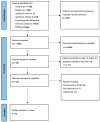Motivational Interviewing as a Strategy to Improve Adherence in IBD Treatment: An Integrative Review Amidst COVID-19 Disruptions
- PMID: 38921325
- PMCID: PMC11204356
- DOI: 10.3390/healthcare12121210
Motivational Interviewing as a Strategy to Improve Adherence in IBD Treatment: An Integrative Review Amidst COVID-19 Disruptions
Abstract
Aims and Objectives: This review aims to analyze the effectiveness of motivational interviewing (MI) in enhancing therapeutic adherence and compliance in adult patients with inflammatory bowel disease (IBD), especially considering the disruptions caused by the COVID-19 pandemic. Background: IBD, which includes conditions such as ulcerative colitis and Crohn's disease, affects over 10 million people globally. It significantly impacts both physical and psychological well-being, leading to challenges in therapeutic adherence. Only 25-47% of patients with IBD adequately follow prescribed treatments. Design and Methods: An integrative methodology that combines qualitative and quantitative research was utilized, following a 7-step framework. This framework encompasses identifying the research question, devising a search strategy, performing a critical appraisal, summarizing findings, extracting data, conducting an analysis, and drawing conclusions. Results: Poor adherence to therapy among patients with IBD can exacerbate disease progression and result in complications. MI has been identified as a promising approach to improving both adherence and treatment outcomes. Studies, including those predating the COVID-19 pandemic, have demonstrated MI's effectiveness in enhancing adherence among patients with IBD. Conclusions: MI shows promise in enhancing adherence among adult patients with IBD. Although initial results are promising, additional research is needed to thoroughly understand its effectiveness across various clinical contexts. Relevance to Clinical Practice: The findings underscore the potential of MI as an integral component of IBD treatment strategies, suggesting that its implementation could enhance patient-provider interactions and lead to better overall health outcomes.
Keywords: COVID-19; inflammatory bowel disease; integrative review; motivational interviewing; patient engagement; telemedicine; therapeutic adherence.
Conflict of interest statement
The authors declare no conflict of interest.
Similar articles
-
The Influence of Motivational Interviewing on Patients With Inflammatory Bowel Disease: A Systematic Review of the Literature.J Clin Med Res. 2017 Aug;9(8):659-666. doi: 10.14740/jocmr3081w. Epub 2017 Jul 1. J Clin Med Res. 2017. PMID: 28725313 Free PMC article. Review.
-
The Impact of Inflammatory Bowel Disease in Canada 2018: Children and Adolescents with IBD.J Can Assoc Gastroenterol. 2019 Feb;2(Suppl 1):S49-S67. doi: 10.1093/jcag/gwy056. Epub 2018 Nov 2. J Can Assoc Gastroenterol. 2019. PMID: 31294385 Free PMC article.
-
The Effectiveness of Motivational Interviewing on Glycemic Control for Adults with Type 2 Diabetes Mellitus (DM2): A Systematic Review.JBI Libr Syst Rev. 2012;10(42 Suppl):1-17. doi: 10.11124/jbisrir-2012-246. JBI Libr Syst Rev. 2012. PMID: 27820150
-
The Impact of Inflammatory Bowel Disease in Canada 2018: Direct Costs and Health Services Utilization.J Can Assoc Gastroenterol. 2019 Feb;2(Suppl 1):S17-S33. doi: 10.1093/jcag/gwy055. Epub 2018 Nov 2. J Can Assoc Gastroenterol. 2019. PMID: 31294382 Free PMC article.
-
Interventions combining motivational interviewing and cognitive behaviour to promote medication adherence: a literature review.J Clin Nurs. 2015 May;24(9-10):1163-73. doi: 10.1111/jocn.12738. Epub 2014 Nov 25. J Clin Nurs. 2015. PMID: 25420723 Review.
Cited by
-
Inflammatory bowel diseases during the COVID-19 pandemic.Prz Gastroenterol. 2024;19(3):231-235. doi: 10.5114/pg.2024.143143. Epub 2024 Sep 18. Prz Gastroenterol. 2024. PMID: 39802974 Free PMC article. Review.
References
-
- Pullen N., Gale J.D. Inflammatory Bowel Disease. Elsevier; Amsterdam, The Netherlands: 2007.
-
- Bernstein C.N., Eliakim A., Fedail S., Fried M., Gearry R., Goh K.-L., Hamid S., Khan A.G., Khalif I., Ng S.C., et al. World Gastroenterology Organisation Global Guidelines Inflammatory Bowel Disease: Update August 2015. J. Clin. Gastroenterol. 2016;50:803–818. doi: 10.1097/MCG.0000000000000660. - DOI - PubMed
Publication types
LinkOut - more resources
Full Text Sources


